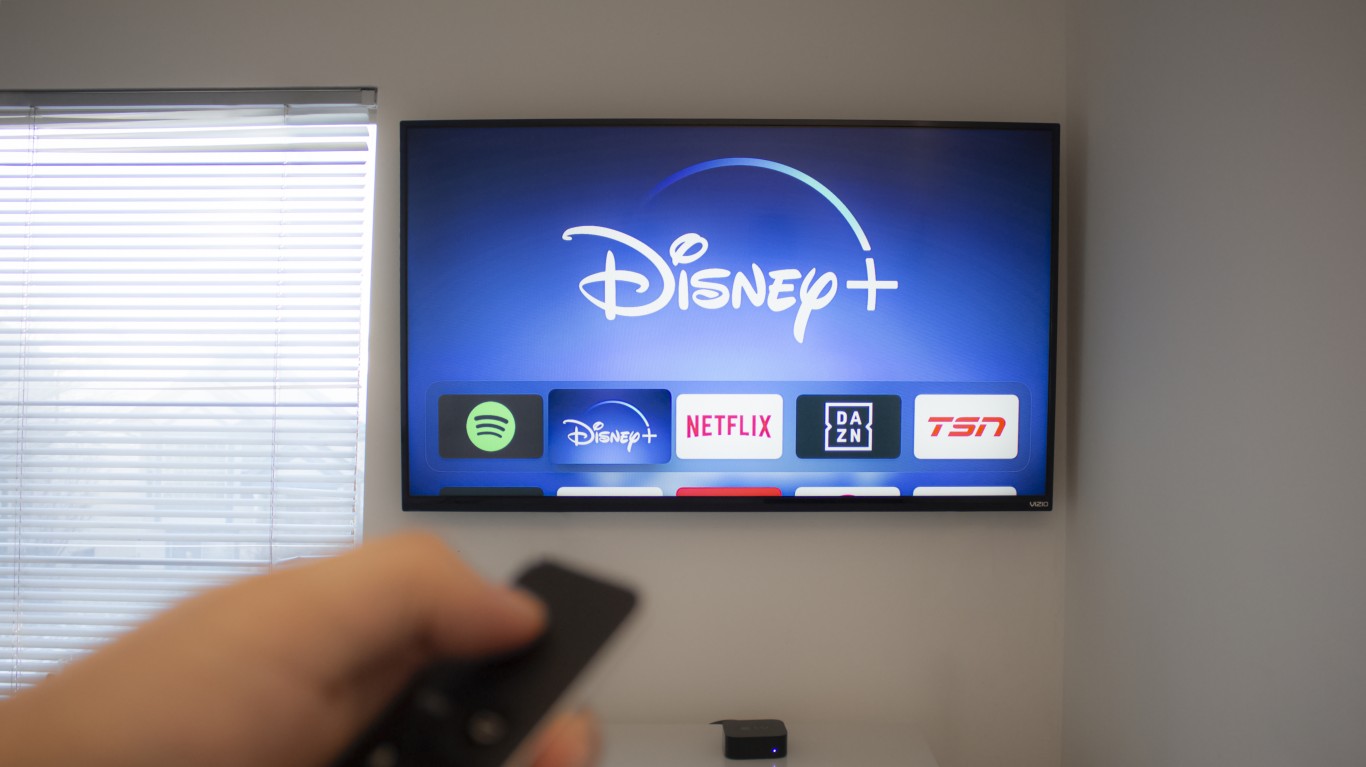Special Report
Walt Disney (DIS) Stock Price Prediction in 2030: Bull, Base & Bear Forecasts

Published:

The Walt Disney Co. (NYSE: DIS) reached its 100th birthday in 2023. In 1928, five years after its founding, Mickey Mouse joined the company, and the rest is history.

Before becoming a publicly traded company in 1957, the studio that Walt and Roy Disney built had introduced a dog (later named Pluto) in 1930 and Donald Duck (1934), won an Academy Award for the studio’s cartoon short “The Three Little Pigs” (1933), and released its first feature-length animated film, “Snow White and the Seven Dwarfs” (1937). Disneyland opened and “The Mickey Mouse Club” debuted on TV in 1955.
The company offered 155,000 preferred shares at $25 each and 600,000 common shares at $5 each in March 1940, raising $9 million. The common stock traded over the counter and Disney completed a 2-for-1 stock split in August 1956, before listing on the New York Stock Exchange in 1957 at $13.88 per share.
A $1,000 investment in the IPO would have bought 72 whole shares. Following six more stock splits, that investment would now own 384 shares (768 if the investment had been made before Disney’s IPO), worth around $35,000 ($70,200) at current prices. At its all-time high price of just over $203 in March 2021, those 384 shares were worth about $78,000 (768 shares would have been worth $155,900).
Since its last stock split in 1998, Disney shares have gained about 232% compared to a gain of almost 312% for the S&P 500 and a gain of about 585% for the Nasdaq Composite. Over the past five fiscal years, shares have declined by more than 16%.





Disney will report first-quarter 2024 results in early February. Analysts expect the company to post $92.51 billion in full-year revenue, with earnings rising to around $6.22 billion. Disney’s price-to-earnings (P/E) ratio for the next 12 months is 18x, down from 18.8x at the end of 2022. Its P/E ratio for the trailing twelve months is 65.6x, up from 57.1x at the end of 2022.
Note that Disney had negative income in the pandemic year of 2020, and the P/E ratio soared to 157.2x in 2021. The trailing 12-month ratio remains much higher than in the pre-pandemic year, while the forward P/E ratio is in line with the earlier range.

Our predicted prices for Disney stock in 2030 are $250 (base), $350 (bull), and $120 (bear). We’ll break down each of these scenarios in more detail below.

Despite its status as one of the world’s top brands, Disney had a tough year in 2023. It dropped four places to finish 13th in Interbrand’s list of the best global brands and its brand value fell by 4% to $48.26 billion. The company took a non-cash $721 million goodwill impairment charge in fiscal 2023 related to its entertainment and international sports linear (cable) networks.
Robert Iger returned as CEO in November 2022, and the following February, he promised to do four things:
The restructuring has occurred, and a $0.30 per share quarterly dividend was restored in December 2023. The company last paid a quarterly dividend of $0.88 in December of 2019.
Iger’s plan beat back an early battle with activist investor Nelson Peltz’s Trian Management, at least for a while. But, in late November, Trian, which holds about $3 billion in Disney stock, launched a proxy battle for three board seats after Disney’s board rejected Peltz’s request for the seats.
Cutting losses will take longer. The company cut 7,000 jobs in 2023, and another 300 or so will be let go at Pixar later this year. But subscriber growth and ESPN profits moved Iger to boost Disney’s cost-cutting target by $2 billion to a total of $7.5 billion. Iger has not indicated when he expects the company to reach that target.
Using a consensus EPS estimate for fiscal 2024 of $4.35, expected annual profit growth of 12%, and a P/E multiple of 26, Disney’s share price in 2030 could reach $250. That’s our base case prediction.

While a share price of $250 in 2030 may seem bullish, it’s quite moderate when measured against analysts’ expectations. Of 32 analysts covering the stock, 23 have rated the shares a Buy or Strong Buy, and only 2 recommend selling the stock. The average profit growth estimate for the period from 2024 to 2028 is 19.3%.
That’s too rich for a base case in our view. Disney’s cost of revenue has been around two-thirds of revenue for the past four years. Some 90% of those costs are related to services like programming, production, and serving resort guests. Cutting more people threatens quality; raising prices threatens subscriptions and attendance.
Using a discounted cash flow model, revenue could rise by an average of around 7% between 2024 and 2030. Profit could rise by 17.5%. Using the same EPS estimate for fiscal 2024 of $4.35, estimated annual profit growth of 17.5%, and a P/E multiple of 26, Disney’s share price in 2030 could reach $350. That’s our bull case prediction.

To boost its stock price over the next several years, Disney is counting on four major initiatives:
Each of these requires investment as well as cost management. Not every investment will contribute to the goal, and the temptation to reduce costs even more will be hard to ignore. Disney will have to make a number of difficult decisions and will need to get most of them right. This is more difficult that it sounds and investors are unlikely to be patient.
Using the same EPS estimate for fiscal 2024 of $4.35, estimated annual profit growth of 9%, and a P/E multiple of 15x, Disney’s share price in 2030 would be around $120. That’s our bear case prediction.
After two decades of reviewing financial products I haven’t seen anything like this. Credit card companies are at war, handing out free rewards and benefits to win the best customers.
A good cash back card can be worth thousands of dollars a year in free money, not to mention other perks like travel, insurance, and access to fancy lounges.
Our top pick today pays up to 5% cash back, a $200 bonus on top, and $0 annual fee. Click here to apply before they stop offering rewards this generous.
Flywheel Publishing has partnered with CardRatings for our coverage of credit card products. Flywheel Publishing and CardRatings may receive a commission from card issuers.
Thank you for reading! Have some feedback for us?
Contact the 24/7 Wall St. editorial team.